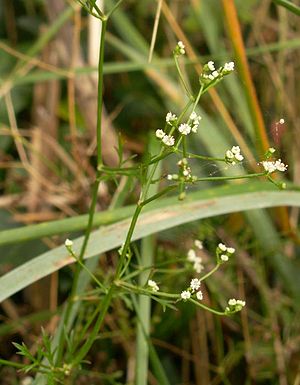Petroselinum segetum
| Petroselinum segetum | ||||||||||||
|---|---|---|---|---|---|---|---|---|---|---|---|---|

Petroselinum segetum , section of an inflorescence |
||||||||||||
| Systematics | ||||||||||||
|
||||||||||||
| Scientific name | ||||||||||||
| Petroselinum segetum | ||||||||||||
| ( L. ) WDJKoch |
Petroselinum segetum is a species of plant from the genus Petroselinum withinthe umbelliferae family (Apiaceae). Their distribution area extends from western to southern Europe.
description
Appearance and foliage leaf
Petroselinum segetum grows as a slender, annual or biennial herbaceous plant . The taproot is slender and spindle-shaped. The above-ground parts of the plant are bare and more or less frosted. It reaches heights of growth of up to 100 centimeters. The upright, not hollow, stalk-round, striped stem is branched spreading.
The leaves , arranged alternately on the stem near the plant base, have a thin petiole. The leaf blade, linear in outline, is simply pinnate . The leaf blades consist of four to twelve pairs of almost sessile, with a length of 0.5 to 3.5 centimeters almost circular to lanceolate, egg-shaped sections, whose sawn or sometimes slightly lobed edges are thickened and whose blunt teeth have a hard edge and a 0 , 5 millimeter long spike tip and tough and bent up.
Inflorescence, flower and fruit
On a long inflorescence stem stands a very irregular double-gold inflorescence with two to ten smooth, unequal, about 3 centimeters long rays, each having an awl bract and two to five awl bracts.
The almost sessile to long-stalked flowers are hermaphroditic, radial symmetry . The sepals are small. The petals are white.
The fruit stalks are short to 15 millimeters long. The split fruit disintegrates into two egg-shaped, laterally flattened, smooth partial fruits with a length of 2.5 to 3 millimeters.
Chromosome number
The number of chromosomes is 2n = 18.
Similar species
Petroselinum segetum can easily be confused with Sison amomum , which has extremely different lengths of umbellate rays and more leaf sections. It has thicker main ribs on the cleft fruits; it also lacks the characteristic smell.
Occurrence
Petroselinum segetum is native to Europe from the United Kingdom via the Netherlands , Belgium southwards via France to Italy , Spain and Portugal . It inhabits unused or grazed agricultural land, pastures , rows of hedges and river banks in the United Kingdom .
Taxonomy
This species was in 1753 under the name Sison segetum by Linnaeus in Species Plantarum , 1, p 252 first published . It was placed in the genus Petroselinum in 1824 under the name Petroselinum segetum by Wilhelm Daniel Joseph Koch in Nova Acta Physico-Medica Academiae Caesareae Leopoldino , Volume 12 (1), page 128 . Another synonym for Petroselinum segetum (L.) WDJKoch is Apium segetum (L.) Dum.
swell
literature
- Thomas Gaskell Tutin : Flora Europaea . Rosaceae to Umbelliferae. Ed .: TG Tutin et al. 1st edition. Volume 2. Cambridge University Press, Cambridge 2010, ISBN 978-0-521-15367-6 , CXXIX Umbelliferae, pp. 352 ( Petroselinum segetum ( L. ) Koch in an edition with a soft cover).
Individual evidence
- ↑ a b c d e f C. Stace, R. van der Meijden & I.de Kort: Petroselinum segetum (Parsley, Corn) . (No longer available online.) In: Interactive Flora of NW Europe. Project of the World Biodiversity Database, formerly the original ; accessed on August 15, 2011 . ( Page no longer available , search in web archives ) Info: The link was automatically marked as defective. Please check the link according to the instructions and then remove this notice.
- ↑ a b c d e f g h i j k l J. M. Burton: Petroselinum segetum (L) Koch Corn Parsley. In: ONLINE ENCYCLOPAEDIA - THE UMBELLIFERAE (CARROT / PARSLEY) FAMILY OF THE BRITISH ISLES. Retrieved August 15, 2011 .
- ^ Petroselinum segetum in the Germplasm Resources Information Network (GRIN), USDA , ARS , National Genetic Resources Program. National Germplasm Resources Laboratory, Beltsville, Maryland. Retrieved August 15, 2011.
Web links
- Distribution in the Netherlands [1] (Dutch)
- Petroselinum segetum from Flora Vascular.